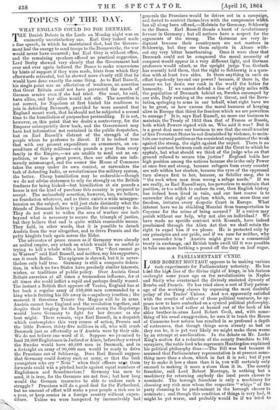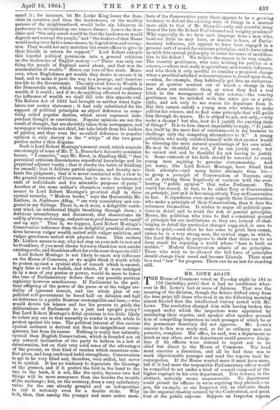A PARLIAMENTARY CYNIC. L ORD ROBERT MONTAGU appears to be making
various rash experiments for Parliamentary notoriety. He has tried the higii line of the divine right of kings, in his furious onslaught some years ago on the revolutionists in Naples and Sicily who overturned the divinely anointed dynasty of Bomba and Francis. He has tried since a sort of Tory patron- age of the working classes by espousing the most doubtful policy of the Trades' Unions. And not apparently satisfied with the results of either of these political ventures, he ap- pears now to have embarked on a cynical political philosophy. He has taken a leaf rather at hazard out of the book of his abler brother-in-arms Lord Robert Cecil, and, with some- thing of his usual exaggeration, he uses it to teach the House of Commons how reform has resulted in so profound a depth of rottenness, that though things seem already as bad as they can be, it is yet very likely we might make them worse by an attempt at amelioration. In the debate on Mr. Locke King's motion for a reduction of the county franchise to 101. occupiers, the noble lord who represents Huntingdon explained his political philosophy thus :—The Bill was bad because it assumed that Parliamentary representation is at present some- thing more than a sham, which in fact it is not ; but if you try to make it less a sham than it is, you will certainly only succeed in making it more a sham than it is. The county franchise, said Lord Robert Montagu, is nothing but a machinery for returning anybody the local peers choose to nominate. The borough franchise is only a machinery for choosing any rich man whom the respective " whips " of the party chancing to be predominant in the borough choose to nominate ; and though this condition of things is very bad, it might be yet worse, and probably would be if we tried to mend it; for instance, let Mr. Locke King lower the fran- chise in counties, and then the laudowners, or the wealthy persons of the neighbourhood, would bribe six labourers in preference to intimidating one tenant-farmer. Lower the fran- chise and "the only result would be that the landowners would degrade and corrupt the people," and "the leaders of that House would seekpower by the same means, by degradation and corrup- tion. They would not only maintain but create offices to give to their friends in return for support." Lord Robert extends this hopeful political pessimism into a general criticism on the tendencies of English society :—" There was only one thing the people of England cared about, and that was the accumulation of wealth." Hence our love of free trade. More- over, when Englishmen get wealth they desire to secure it in land, and to make it pave the way to a peerage, and therefore trackle to the Government. The only rival force to Wealth is the Democratic mob, which would like to seize and confiscate wealth if it could ; and if we do anything effectual to destroy the influence of wealth we shall fall into this opposite evil. The Reform Act of 1832 had brought us neither wiser legis- lators nor neuter statesmen ; it had only substituted for the support of political principles an abject deference to some- thing called popular desires, which never represent inde- pendent thought or conviction. Popular opinions are not the result of thought, but are slavishly taken from newspapers, and newspaper writers do not think, but take briefs from the leaders of parties, and thus even the so-called deference to popular opinion is only slavery to the " whips" of the two great parties under a thin disguise.
Such is Lord Robert Montagu's newest creed, which reminds one strongly of some of Mr. T. L. Peacocke's favourite pessimist heroes. " I conceive," says Mr. Escot, in Headlong Hall, " that periodical criticism disseminates superficial knowledge and its perpetual adjunct vanity ; that it checks the habit of thinking for oneself ; that it delivers partial opinions, and thereby mis- leads the judgment ; that it is never conducted with a view to the general interests of literature, but to serve the interested ends of individuals and the miserable purposes of party." Another of the same author's characters comes perhaps yet nearer to Lord Robert Montagu's practical drift in these cynical remarks, " Modern books," says the Honourable Mr. Listless, in Nightmare Abbey, " are very consolatory and con- genial to my feelings. There is, as it were, a delightful north- east wind, an intellectual blight breathing through them • a delicious misanthropy and discontent, that demonstrates the nullity of virtue and energy, and puts me in good humour with myself and my sofa." That is, we suppose, Lord Robert Montagu's Conservative inference from these delightful practical alterna- tives between vulgar wealth united with vulgar ambition, and vulgar greediness united with physical force. This modern Mr. Listless means to say, why not stay on your sofa to rest and be thankless, if you must choose between thankless rest amidst existing evils, and thankless effort for evils more desperate still ?
Lord Robert Montagu is not likely to exert any influence on the House of Commons, or we might think it worth while to protest against a cynical style of remark which is exceed- ingly false as well as foolish, and which, if it were indulged in by a man of any genius or power, would do more to lower the tone of Parliamentary debate than any possible partizan sophistry however mischievous. If Parliament be the poli- tical offspring of the power of the purse or of the vulgar cre- dulity of ignorant conceit, and the whole plan of our political self-government be based half on delusion and half on deference to a public Rumour contemptible and base,—who would devote his leisure and tax his powers to guide the deliberations of Parliament to a just and upright policy ? Bat Lord Robert Montagu's fitful cynicism is too little likely to infect any one in that assembly to render it worth while to protest against his tone. The political interest of this curious cynical outburst is derived not from its insignificant conse- quences, but from its causes. Nothing is really less naturally cynical than English Conservatism, which is founded not on' any natural inclination of the party to believe in a law of deterioration, but on their very solid sense of the advantages of the present, oh that kind of caution which conscious com- fort gives, and long confirmed habit strengthens. Conservatism is apt to Le very blind and, therefore, very selfish, but never to be cynical. It has no tendency to depreciate the blessings of the present, and if it prefers the bird in the hand to the two in the bush, it is not, like the cynic, because two bad things will be more annoyance than one besides the trouble of the exchange; but, on the contrary, from a very satisfactory value for the one already grasped and an indisposition to risk it seriously even for a double stake. Why is it, then, that among the younger and more active mem- bers of the Conservative party there appears to be a growing tendency to defend the existing state of things in a manner more akin to that of Mr. Disraeli's early and scornful irony than of the late Sir Robert Peel's formal and weighty prudence? Why especially do we hear such language from a man who, however little he may have, or deserve to have, of Parlia- mentary influence, yet appears to have been engaged in a genuine sort of search for extreme principles, and to have taken up with this cynical philosophy to cover his sense of mortifica- tion in his defeat ? We believe the reason to be very simple. The country gentlemen, who care nothing for politics as a science,—whose real study is agriculture and county influence, and who think it only needful to consider a proposed change when a practical mischief or inconvenience is forced upon them, —when, for example, they habitually get into an embarrass- ment at quarter sessions out of which a change in the law alone can extricate them, or when they find a real hitch in the management of their estates,—the country gentlemen can be satisfied with the status quo as a prin- ciple, and ask only to see reason for departure from it. But this cannot satisfy a young man who wishes to make politics his science, and to find some principle that will guide him through its mazes. He is obliged to ask, not only,--why make a change ? but also, how do I justify the existing state of things ? It is to him almost impossible to reply, " It justi- fies itself by the mere fact of existence—it is my business to challenge only the competing alternatives to it." A young politician who really satisfied himself with that answer would be silencing the most natural questionings of his own mind. He may be thankful for rest, if he can justify rest; but he cannot rest and be thankful for not having to justify it. Some rationale of his faith should be essential to every young man aspiring to genuine statesmanship. And yet many, like Lord Robert Montagu, have found that their attempts—and many better attempts than his— to grasp a principle of Conservatism or Toryism, only end in putting them hopelessly at variance with the over- bearing " public opinion " that rules Parliament. The world has ceased, in fact, to be either Tory or Conservative on principle; just as it is becoming utterly Tory or Conservative in fact. It repudiates even more eagerly those Conservatives who make a principle of their Conservatism, than it does the reformers themselves. It wishes to argue all political ques- tions in detail and to avoid the risk of general principles.
Hence, the politician who tries to find a consistent ground of principle for our institutions as they are, instead of chal- lenging in detail the particular changes suggested, is sure to come to grief,—and after he has come to grief, then comes, unless he is a very strong man, the cynical stage, in which, like Lord Montagu, he proposes to show that there can be no locus standi for repairing a world whose "base is built on stubble." Modern Conservatism admits of no principles. Those who wish to be allowed the full force of principles should change their creed and become Liberals. There must be a real "law " for progress. There can be no law for standing still.































 Previous page
Previous page